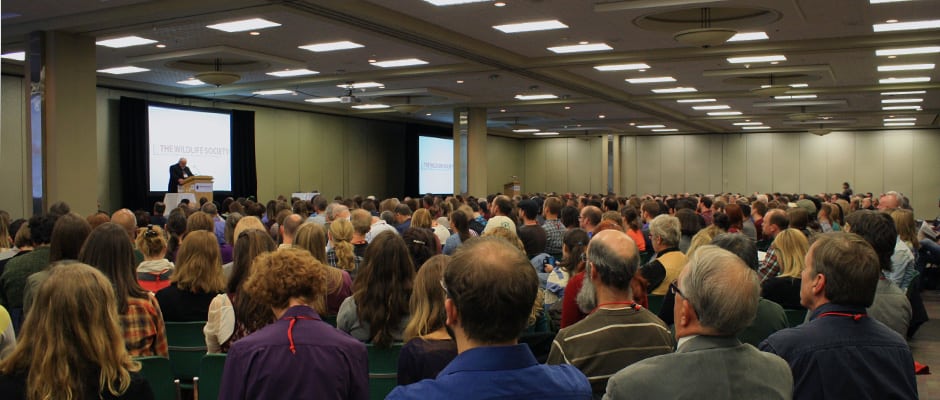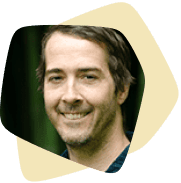Share this article
Wildlife Connections the Theme of Packed Plenary Event
Rick Baydack, president of The Wildlife Society, kicked off the plenary at The Wildlife Society’s 22nd Annual Conference in Winnipeg, by bringing up the theme of his leadership tenure: Why Do Wildlife Matter.
A striking way of looking at his question was in the sheer numbers alone. Wildlife certainly mattered to the more than 1,500 attendees and counting who signed up for the conference. It mattered so much that dozens of people who weren’t early enough to get a seat at the packed plenary session yesterday stood at the back of the room for the entire three-hour event.
And yet, as Baydack said, there is no one good answer for why wildlife matter, but rather hundreds that come to mind. He then invited four distinguished plenary speakers — Robert Warren, Richard Louv, Ovide Mercredi and Erin McCance — to share with more than an estimated 500 attendees the reasons why wildlife matter to them, and why wildlife should matter to all of us.
Past Conservationists Carry a Legacy
Robert Warren, a Wildlife Ecology and Management professor at the University of Georgia and last year’s recipient of the Aldo Leopold Memorial Award, kicked off the plenary by evoking the past of wildlife conservation and how his mentors gave him a passion for continuing in the wildlife profession.
“To this day I vividly remember how proud I was when I joined The Wildlife Society,” the past president and former editor of the Wildlife Society Bulletin said. “It was such a sense of pride.”
He said that while species like the passenger pigeon went extinct, the legacy of early conservationists like Teddy Roosevelt and Jay “Ding” Darling are responsible for saving some of the wildlife species that we all benefit from today.
One example was the white tailed deer. Although it’s hard to imagine since the deer are now so abundant in some areas that they are even considered a pest, he said the deer were a rare species when he began his career.
According to Warren, it’s this kind of respect for our natural resources that needs to be passed on to future generations.
“Conservation is about our entire native flora and fauna,” he said.
Diversity and the Continuing Lessons From the Past
Erin McCance, a graduate of the 2014 TWS Leadership Institute who recently finished her doctoral work at the University of Manitoba, also turned to some of the lessons of conservation from the past. Among these, she spoke about her grandfather Donald Ian MacDonald, the first chief commissioner of Winnipeg. MacDonald, who was instrumental with the preservation of Assiniboine Forest and involved in numerous other conservation projects including working with Ducks Unlimited to establish Oak Hammock Marsh, was an inspiration in guiding McCance’s career in wildlife.
McCance, now a consultant with Joro Consultants, a local firm that focuses on environment and biologist research, spoke about the continuing pressures facing wildlife, including shrinking fresh water supplies, climate change, an alarming rate of global biodiversity loss and human overpopulation, among other things.
“Without question, humans leave large footprints wherever we go,” she said.
She also called for the need to include a broader spectrum of the human population within wildlife professions.
“We need to aim for a vision to encourage diversity in our profession,” she said.
Relations With Wildlife From a Cree Perspective
Ovide Mercredi, the chief of the Misipawistik Cree Nation from 2005-2011 and current president of New Democratic Party of Manitoba said that he grew up with “a Cree understanding of the earth itself — what you call wildlife and what we call our relatives.”
He said that he was born and raised along the Saskatchewan River, and that when he was young, he would harvest bird eggs, never taking all the eggs from one nest, and never taking more eggs than he needed.
In terms of our relationship with wildlife, Mercredi said that the Cree have an understanding of what is right and wrong, and that certain kinds of misbehavior in relation to our environment can come back to affect you negatively in the future.
“What we do to our animals we do to ourselves,” he said.
He recited a poem he wrote about maintaining the continuity of traditional wildlife relationships, saying that this relationship is part of his constant thought process.
“Our survival is contingent on [wildilfe’s] survival. It’s not a very complicated idea,” he said near the end of the speech, drawing the audience into a standing ovation.
Cultivating a Connection With Nature From Childhood
Richard Louv, a journalist and author of eight books and television personality, believes we need to give children a positive attachment to wildlife and nature early in their lives in order to develop long-lasting relationships.
“If we’re not careful, they will only carry nature in our briefcases and not in their hearts, said the co-founder and chairman emeritus of the Children & Nature Network, which attempts to connect communities and people with nature.
He spoke about studies that show that people who spend more time outside, backpacking in nature, have better cognitive abilities and better creativity, illustrating exactly why we need to “give the gift of nature” to children more often.
He finished by saying that it would be great to have more than just a sustainable future in terms of our relationship with wildlife. “We want a nature rich future,” he said. “This should be considered a right for all children.”
TWS Presents Aldo Leopold Award
Also during the plenary, The Wildlife Society presented James D. Nichols with the 2015 Aldo Leopold Award — the Society’s highest honor.
“He is arguably the most influential researcher in wildlife population dynamics worldwide,” Baydack said, adding that Nichols had published more than 400 scientific reports in more than 70 academic journals and publications throughout “his well-established and distinguished career.”
Nichols, who has been a TWS member for more than 40 years, has also worked with biologists in Canada, Brazil, India, New Zealand, Australia and other countries.








